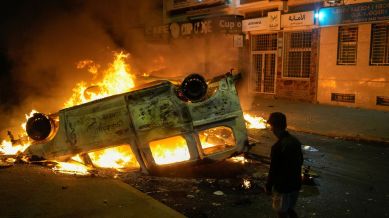Morocco protests enter fifth night as anger over public services turns deadly | Explained in 5 points
What began as youth-driven demonstrations over failing public services has now descended into deadly confrontations with police, mass arrests, and widespread property damage.

Anti-government protests in Morocco have entered their fifth consecutive night, escalating into the country’s most violent unrest in years. What began as youth-driven demonstrations over failing public services has now descended into deadly confrontations with police, mass arrests, and widespread property damage.
monthly limit of free stories.
with an Express account.
Here is what you need to know
- 01
What is happening in Morocco?
On Wednesday night, police opened fire on protesters in the southern town of Leqliaa, killing two people in what officials described as an act of self-defense. Local authorities claimed the demonstrators — labeled “troublemakers” by Morocco’s state news agency MAP — were attempting to seize police weapons, though eyewitnesses have not corroborated the account as per AP.
The fatalities mark the first deaths since protests erupted last weekend. By midweek, violence had spread across multiple cities. In Sale, near the capital Rabat, an Associated Press reporter witnessed masked teenagers torching cars, smashing shop windows, and looting banks with no police present. In Oujda, eastern Morocco’s largest city, a police vehicle rammed into protesters, injuring at least one person.
The Interior Ministry confirmed 409 arrests nationwide, saying demonstrations were unauthorized and would be met “rigorously and firmly.” The ministry also reported 263 injured law enforcement officers, damage to 142 police vehicles, and 23 civilian injuries.
- 02
How did it start?
The unrest, dubbed the “Gen Z protests,” began Saturday as a leaderless youth movement organised on TikTok and Discord, by a loosely formed youth group that calls itself GenZ 212. Young Moroccans say they are fed up with corruption, poor schools and hospitals, and uneven development across the country.
Protesters have contrasted billions being spent to prepare for the 2030 World Cup with dire conditions in public services. One slogan has spread widely online and on the streets: “Stadiums are here, but where are the hospitals?” The deaths of eight women at a public hospital in Agadir have further fueled anger over the health system. Protesters have been voicing demands for stronger healthcare and education systems, as well as greater job opportunities.
The demonstrations initially remained peaceful, with organisers urging calm in online statements and condemning what they described as “repressive security approaches.” But after days of mass arrests and a heavy-handed police response, violence broke out in several cities.
However, the Gen-Z group in a Facebook post on Tuesday, expressed "regret over acts of rioting or vandalism that affected public or private property" and urged participants to remain peaceful and avoid any behaviour that could "undermine the legitimacy of our just demands".
- 03
How did authorities respond?
Morocco’s Interior Ministry defended the ongoing crackdown, saying the anonymously organised protests were unauthorized and insisting that anyone breaking the law would be dealt with “rigorously and firmly.”
In Oujda, the country’s largest eastern city, tensions escalated when a police vehicle rammed into demonstrators, leaving one person injured, according to local human rights groups and the state news agency MAP.
The Moroccan Association for Human Rights (AMDH) reported that 37 protesters arrested in Oujda on Monday — including six minors — were set to appear in court on Wednesday. The group added that hundreds more have been detained nationwide, with some arrests caught on video by local media and others carried out by plainclothes officers during live interviews.
Amnesty International has called on Moroccan authorities to “engage with the legitimate demands of the youth” rather than relying solely on force.
- 04
Why it matters?
The “Gen Z protests” highlight deep generational and regional inequalities in Morocco at a politically sensitive time. With the country set to host the Africa Cup of Nations later this year and parliamentary elections looming in 2026, the unrest has become a serious test of how the monarchy and government balance international prestige projects with domestic frustrations.
With billions in investment flowing toward preparations for the 2030 World Cup, anger boomed internet-savvy youth who launched some of the country’s biggest street protests in years. “The right to health, education and a dignified life is not an empty slogan but a serious demand,” the organizers wrote in a statement on Discord.
- 05
What's next?
The “Gen Z” protests that mirror similar unrest sweeping countries like Nepal and Madagascar, has gained further support since authorities started making arrests over the weekend, including endorsements from Morocco’s star goalkeeper Yassine Bounou and rapper El Grande Toto.
Government officials have rejected claims that World Cup investments take precedence over public infrastructure, noting that many of the health sector challenges were inherited from prior administrations. Meanwhile, Morocco’s parliamentary majority announced it will convene on Thursday to discuss healthcare and hospital reforms under the leadership of Prime Minister Aziz Akhannouch.